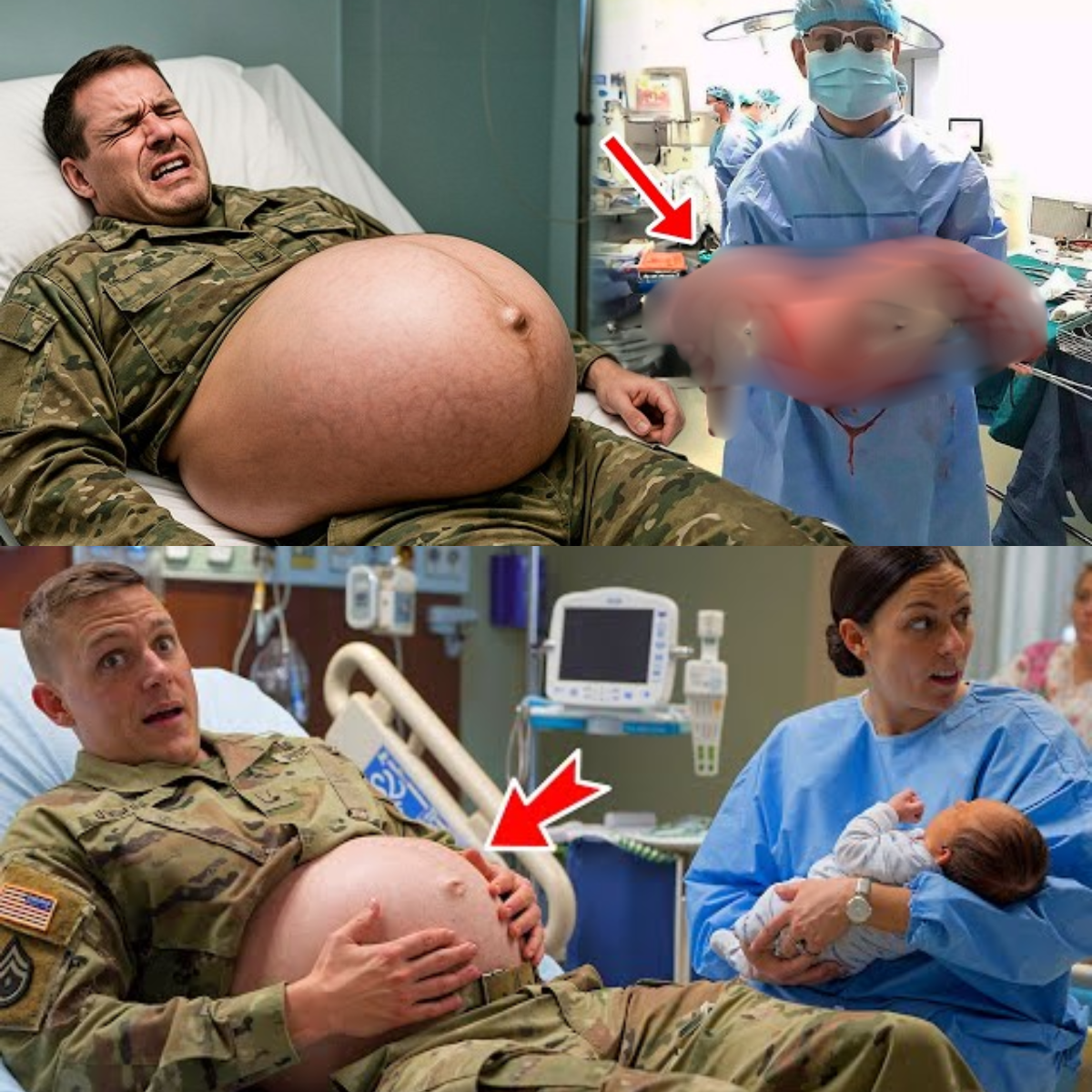The hospital was quiet that night — the kind of silence that sits heavily between the hum of machines and the distant shuffle of nurses’ shoes. Dr. Felipe had just poured himself a cup of bitter coffee and sat down to review lab results when the sound of panic tore through the calm.
“HELP! PLEASE, SOMEBODY HELP US!”
He froze. The voice wasn’t the usual frantic tone of a family member or a nurse — it was deeper, strained, and filled with terror.
He dropped his pen and ran toward the emergency entrance. The smell of rain and exhaust filled the corridor. When he turned the corner, what he saw made him stop dead in his tracks.

Two soldiers stood in the doorway. One, tall and broad-shouldered, was supporting another — a much younger man in uniform, no older than twenty-five. The younger soldier’s face was pale, his breathing ragged, his entire body shaking. But what struck everyone in the room was not his fear — it was his belly.
Round, full, and impossibly large.
So large, in fact, that for a moment, everyone thought their eyes were deceiving them.
The young man looked like a woman in the final stage of pregnancy.
“My God…” the doctor whispered. “Is that—?”
Before he could finish the thought, the young soldier cried out, clutching his stomach. “It hurts! Oh God, it hurts!”
“Quick! Get a stretcher!” Dr. Felipe ordered, snapping out of his daze. The nurses hesitated for only a second before springing into motion. Within moments, the soldier — whose name, the doctor later learned, was Carlos — was laid out on the bed, sweat pouring down his face.
Felipe knelt beside him. “I’m Dr. Felipe. What happened to you, soldier? How long have you been feeling this pain?”
Carlos could barely speak. His lips trembled. “I don’t know… it started two days ago. My stomach kept growing. The pain got worse… I thought I was going to die.”
The doctor frowned, scanning the soldier’s uniform and the impossible roundness of his abdomen. He pressed gently on the side of Carlos’s stomach — the skin was tight, warm, and strangely firm.
“Sir, please,” begged the other soldier, his voice breaking. “He was fine a week ago. Then his belly started swelling. We thought it was an infection, or a parasite. But now… it’s like something’s alive inside him.”
Felipe’s blood ran cold. He stood up abruptly. “Prepare the ultrasound. Now.”
The nurses rolled the equipment to the bedside, their hands trembling. Felipe applied the gel to the soldier’s abdomen, turned on the machine, and placed the probe. The screen flickered.
And then — two distinct heartbeats appeared.
Loud. Rhythmic. Unmistakable.
ChatGPT đã nói:
SOLDIER ARRIVES AT HOSPITAL PREGNANT — WHEN THE BABY IS BORN, THE DOCTOR FAINTS!
The hospital was quiet that night — the kind of silence that sits heavily between the hum of machines and the distant shuffle of nurses’ shoes. Dr. Felipe had just poured himself a cup of bitter coffee and sat down to review lab results when the sound of panic tore through the calm.
“HELP! PLEASE, SOMEBODY HELP US!”
He froze. The voice wasn’t the usual frantic tone of a family member or a nurse — it was deeper, strained, and filled with terror.
He dropped his pen and ran toward the emergency entrance. The smell of rain and exhaust filled the corridor. When he turned the corner, what he saw made him stop dead in his tracks.
Two soldiers stood in the doorway. One, tall and broad-shouldered, was supporting another — a much younger man in uniform, no older than twenty-five. The younger soldier’s face was pale, his breathing ragged, his entire body shaking. But what struck everyone in the room was not his fear — it was his belly.
Round, full, and impossibly large.
So large, in fact, that for a moment, everyone thought their eyes were deceiving them.
The young man looked like a woman in the final stage of pregnancy.
“My God…” the doctor whispered. “Is that—?”
Before he could finish the thought, the young soldier cried out, clutching his stomach. “It hurts! Oh God, it hurts!”
“Quick! Get a stretcher!” Dr. Felipe ordered, snapping out of his daze. The nurses hesitated for only a second before springing into motion. Within moments, the soldier — whose name, the doctor later learned, was Carlos — was laid out on the bed, sweat pouring down his face.
Felipe knelt beside him. “I’m Dr. Felipe. What happened to you, soldier? How long have you been feeling this pain?”
Carlos could barely speak. His lips trembled. “I don’t know… it started two days ago. My stomach kept growing. The pain got worse… I thought I was going to die.”
The doctor frowned, scanning the soldier’s uniform and the impossible roundness of his abdomen. He pressed gently on the side of Carlos’s stomach — the skin was tight, warm, and strangely firm.
“Sir, please,” begged the other soldier, his voice breaking. “He was fine a week ago. Then his belly started swelling. We thought it was an infection, or a parasite. But now… it’s like something’s alive inside him.”
Felipe’s blood ran cold. He stood up abruptly. “Prepare the ultrasound. Now.”
The nurses rolled the equipment to the bedside, their hands trembling. Felipe applied the gel to the soldier’s abdomen, turned on the machine, and placed the probe. The screen flickered.
And then — two distinct heartbeats appeared.
Loud. Rhythmic. Unmistakable.
The doctor’s mouth went dry. “No…” he whispered. “That can’t be possible.”
The room fell silent. The nurse standing beside him covered her mouth with her hand. “Doctor… are those—?”
“Twins,” he said hoarsely. “There are two of them.”
Carlos groaned, his back arching in pain. “What’s happening to me?” he cried. “Please, make it stop!”
The doctor turned to the nurses. “Prep the operating room! Emergency delivery! We can’t wait.”
Within minutes, Carlos was wheeled down the hallway, his screams echoing through the sterile white walls. The entire hospital seemed to hold its breath.
Inside the operating room, the atmosphere was electric with disbelief. The team moved automatically — monitors attached, oxygen mask in place, lights overhead. Felipe’s mind was racing, trying to anchor itself in science, in logic, in anything that made sense. But nothing did.
As the contractions intensified, he saw it — movement beneath the soldier’s skin, a ripple that traveled from one side of the abdomen to the other. The nurses exchanged terrified glances.
“Doctor,” one whispered, “should we call—”
“No time,” Felipe snapped. “Scalpel.”
They worked quickly. Sweat rolled down the doctor’s forehead as he made the incision. Moments later, the impossible happened.

A cry.
The sharp, unmistakable cry of a newborn baby filled the room.
The nurses gasped. One covered her face, whispering a prayer under her breath. Felipe lifted the infant — small, fragile, perfect — and handed it to the nearest nurse. The baby was breathing, crying, alive.
But it wasn’t over.
“There’s another one,” he said, his voice shaking. “We’re not done.”
He reached again, carefully, and felt the second child’s movement. With one final push, the second baby was delivered.
But the moment Felipe saw it, the world tilted.
The second baby’s skin wasn’t like the first. It was pale, almost translucent, veins visible beneath the surface. Its eyes opened immediately — wide, unblinking, strange.
The room went silent. The nurses froze.
The baby wasn’t crying. It was staring — directly at the doctor.
Felipe’s heart pounded. He stumbled backward, the scalpel clattering to the floor. The sound seemed to echo forever in the quiet room.
One of the nurses whispered, “Doctor… what’s wrong?”
Felipe couldn’t answer. His vision blurred. The last thing he saw before everything went black was the second baby’s eyes — glowing faintly under the harsh fluorescent light.
He fainted.
When he woke up hours later, the hospital was in chaos. The second baby was gone. The soldiers who had brought Carlos in had vanished, leaving behind their uniforms and identification tags.
Security footage from the maternity ward showed nothing unusual — no one entering or leaving. It was as if the infant had simply… disappeared.
Carlos, barely conscious, asked one question before slipping into sleep. “Where’s my child?”
No one could answer him.
Days later, military officials arrived. They sealed the hospital wing, confiscated the medical records, and issued a formal statement: “A case of medical misdiagnosis and post-traumatic delusion.”
But those who were there knew better.

The nurses who helped deliver the babies never spoke publicly again. Some quit their jobs. Some moved away. And Dr. Felipe — once one of the most respected obstetricians in the city — retired early, refusing to talk about what happened that night.
But in quiet corners of the hospital, rumors persisted. That sometimes, late at night, the sound of a baby crying could still be heard echoing through the maternity ward — even though there were no infants in the room.
And in the middle of it all, one truth remained:
A soldier had arrived pregnant.
He had given birth to twins.
And one of them — the one that made the doctor faint — was never seen again.
What really happened in that hospital?
No one knows.
But those who were there will never forget the look in that baby’s eyes.
The doctor’s mouth went dry. “No…” he whispered. “That can’t be possible.”
The room fell silent. The nurse standing beside him covered her mouth with her hand. “Doctor… are those—?”
“Twins,” he said hoarsely. “There are two of them.”
Carlos groaned, his back arching in pain. “What’s happening to me?” he cried. “Please, make it stop!”
The doctor turned to the nurses. “Prep the operating room! Emergency delivery! We can’t wait.”
Within minutes, Carlos was wheeled down the hallway, his screams echoing through the sterile white walls. The entire hospital seemed to hold its breath.
Inside the operating room, the atmosphere was electric with disbelief. The team moved automatically — monitors attached, oxygen mask in place, lights overhead. Felipe’s mind was racing, trying to anchor itself in science, in logic, in anything that made sense. But nothing did.
As the contractions intensified, he saw it — movement beneath the soldier’s skin, a ripple that traveled from one side of the abdomen to the other. The nurses exchanged terrified glances.
“Doctor,” one whispered, “should we call—”
“No time,” Felipe snapped. “Scalpel.”
They worked quickly. Sweat rolled down the doctor’s forehead as he made the incision. Moments later, the impossible happened.
A cry.
The sharp, unmistakable cry of a newborn baby filled the room.
The nurses gasped. One covered her face, whispering a prayer under her breath. Felipe lifted the infant — small, fragile, perfect — and handed it to the nearest nurse. The baby was breathing, crying, alive.
But it wasn’t over.
“There’s another one,” he said, his voice shaking. “We’re not done.”
He reached again, carefully, and felt the second child’s movement. With one final push, the second baby was delivered.
But the moment Felipe saw it, the world tilted.
The second baby’s skin wasn’t like the first. It was pale, almost translucent, veins visible beneath the surface. Its eyes opened immediately — wide, unblinking, strange.
The room went silent. The nurses froze.
The baby wasn’t crying. It was staring — directly at the doctor.
Felipe’s heart pounded. He stumbled backward, the scalpel clattering to the floor. The sound seemed to echo forever in the quiet room.
One of the nurses whispered, “Doctor… what’s wrong?”
Felipe couldn’t answer. His vision blurred. The last thing he saw before everything went black was the second baby’s eyes — glowing faintly under the harsh fluorescent light.
He fainted.
When he woke up hours later, the hospital was in chaos. The second baby was gone. The soldiers who had brought Carlos in had vanished, leaving behind their uniforms and identification tags.
Security footage from the maternity ward showed nothing unusual — no one entering or leaving. It was as if the infant had simply… disappeared.
Carlos, barely conscious, asked one question before slipping into sleep. “Where’s my child?”
No one could answer him.
Days later, military officials arrived. They sealed the hospital wing, confiscated the medical records, and issued a formal statement: “A case of medical misdiagnosis and post-traumatic delusion.”
But those who were there knew better.
The nurses who helped deliver the babies never spoke publicly again. Some quit their jobs. Some moved away. And Dr. Felipe — once one of the most respected obstetricians in the city — retired early, refusing to talk about what happened that night.
But in quiet corners of the hospital, rumors persisted. That sometimes, late at night, the sound of a baby crying could still be heard echoing through the maternity ward — even though there were no infants in the room.
And in the middle of it all, one truth remained:
A soldier had arrived pregnant.
He had given birth to twins.
And one of them — the one that made the doctor faint — was never seen again.
What really happened in that hospital?
No one knows.
But those who were there will never forget the look in that baby’s eyes.
News
Everyone Was Shocked! Kim Finally Confesses a Secret About Paulo Avelino — Fans Left Swooning Nationwide
It was an ordinary day on live television — until it wasn’t. What started as a lighthearted segment suddenly turned…
Kim Chiu Stuns Everyone With Bold Bald Look — Fans Call It “Hollywood-Level,” Netizens Ask: What Was Paulo Avelino’s Reaction?
Just when fans thought they had seen every possible transformation from Kim Chiu — from sweet girl-next-door to fierce leading…
Shocking, Painful, and Brave: The Real Life of Liza Soberano Today — From Philippine Stardom to Finding Her Own Voice
Do you still remember Liza Soberano? She was once called “the most beautiful face of Philippine showbiz.”The girl with the angelic smile,…
INUTUS-UTUSAN AT HINAMAK ANG BAGONG EMPLEYADO — PERO NANG DUMATING ANG “BIG BOSS,”
INUTUS-UTUSAN AT HINAMAK ANG BAGONG EMPLEYADO — PERO NANG DUMATING ANG “BIG BOSS,” NAPALUHOD ANG MANAGER SA HARAP NG KANYANG…
LAGING NILALAIT NG BIYENAN NA “WALANG KWENTANG MAGGUGULAY” — SA ISANG MALAKING PARTY,
LAGING NILALAIT NG BIYENAN NA “WALANG KWENTANG MAGGUGULAY” — SA ISANG MALAKING PARTY, NATUKLASAN NIYANG ANG CHAIRMAN NA SUSUYOIN NIYA…
HE’S BEING LAUGHED BECAUSE HIS FATHER IS A “GASPERER” — BUT AT GRADUATION
SHE IS MADE LAUGHTER BECAUSE HER FATHER IS A “GASMER” — BUT AT GRADUATION, THEY ARE SHOCKED WHEN HE IS…
End of content
No more pages to load












